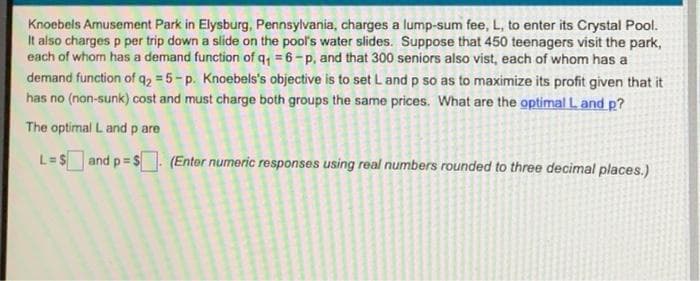Knoebels Amusement Park in Elysburg, Pennsylvania, charges a lump-sum fee, L, to enter its Crystal Pool. It also charges p per trip down a slide on the pool's water slides. Suppose that 450 teenagers visit the park, each of whom has a demand function of q₁ = 6-p, and that 300 seniors also vist, each of whom has a demand function of q2 = 5-p. Knoebels's objective is to set L and p so as to maximize its profit given that it has no (non-sunk) cost and must charge both groups the same prices. What are the optimal L and p? The optimal L and pare L=$and p=$. (Enter numeric responses using real numbers rounded to three decimal places.)
Knoebels Amusement Park in Elysburg, Pennsylvania, charges a lump-sum fee, L, to enter its Crystal Pool. It also charges p per trip down a slide on the pool's water slides. Suppose that 450 teenagers visit the park, each of whom has a demand function of q₁ = 6-p, and that 300 seniors also vist, each of whom has a demand function of q2 = 5-p. Knoebels's objective is to set L and p so as to maximize its profit given that it has no (non-sunk) cost and must charge both groups the same prices. What are the optimal L and p? The optimal L and pare L=$and p=$. (Enter numeric responses using real numbers rounded to three decimal places.)
Economics: Private and Public Choice (MindTap Course List)
16th Edition
ISBN:9781305506725
Author:James D. Gwartney, Richard L. Stroup, Russell S. Sobel, David A. Macpherson
Publisher:James D. Gwartney, Richard L. Stroup, Russell S. Sobel, David A. Macpherson
Chapter23: Price-searcher Markets With Low Entry Barriers
Section: Chapter Questions
Problem 7CQ
Related questions
Question

Transcribed Image Text:Knoebels Amusement Park in Elysburg, Pennsylvania, charges a lump-sum fee, L, to enter its Crystal Pool.
It also charges p per trip down a slide on the pool's water slides. Suppose that 450 teenagers visit the park,
each of whom has a demand function of q₁ = 6-p, and that 300 seniors also vist, each of whom has a
demand function of q₂ = 5-p. Knoebels's objective is to set L and p so as to maximize its profit given that it
has no (non-sunk) cost and must charge both groups the same prices. What are the optimal L and p?
The optimal L and p are
L=$and p=$. (Enter numeric responses using real numbers rounded to three decimal places.)
Expert Solution
This question has been solved!
Explore an expertly crafted, step-by-step solution for a thorough understanding of key concepts.
Step by step
Solved in 2 steps with 2 images

Knowledge Booster
Learn more about
Need a deep-dive on the concept behind this application? Look no further. Learn more about this topic, economics and related others by exploring similar questions and additional content below.Recommended textbooks for you

Economics: Private and Public Choice (MindTap Cou…
Economics
ISBN:
9781305506725
Author:
James D. Gwartney, Richard L. Stroup, Russell S. Sobel, David A. Macpherson
Publisher:
Cengage Learning

Microeconomics: Private and Public Choice (MindTa…
Economics
ISBN:
9781305506893
Author:
James D. Gwartney, Richard L. Stroup, Russell S. Sobel, David A. Macpherson
Publisher:
Cengage Learning

Economics: Private and Public Choice (MindTap Cou…
Economics
ISBN:
9781305506725
Author:
James D. Gwartney, Richard L. Stroup, Russell S. Sobel, David A. Macpherson
Publisher:
Cengage Learning

Microeconomics: Private and Public Choice (MindTa…
Economics
ISBN:
9781305506893
Author:
James D. Gwartney, Richard L. Stroup, Russell S. Sobel, David A. Macpherson
Publisher:
Cengage Learning